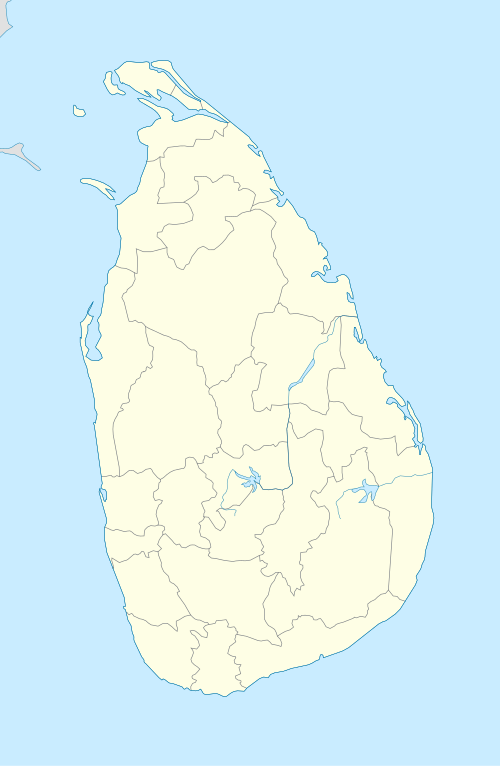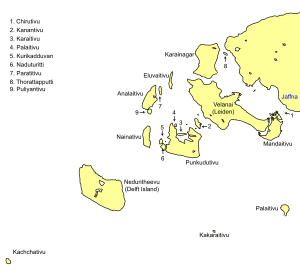Katchatheevu
| Native name: கச்சத்தீவு කච්චතීවු | |
|---|---|
 Katchatheevu | |
| Geography | |
| Coordinates | 9°23′0″N 79°31′0″E / 9.38333°N 79.51667°ECoordinates: 9°23′0″N 79°31′0″E / 9.38333°N 79.51667°E |
| Administration | |
| Province | Northern |
| District | Jaffna |
| DS Division | Delft |
| Demographics | |
| Languages | Tamil |
| Ethnic groups | Sri Lankan Tamils |
| Additional information | |
| Time zone | |
Katchatheevu (Tamil: கச்சத்தீவு, translit. Kaccattīvu, Sinhalese: කච්චතීවු, translit. kaccatīvu) is an uninhabited island administered by Sri Lanka and was a disputed territory claimed by India until 1976. The island is located between Neduntheevu, Sri Lanka and Rameswaram, India and has been traditionally used by both Sri Lankan Tamil and Tamil Nadu fishermen.[1]
The island originated from a volcanic eruption that occurred in the 14th century. In 1974 India recognized Sri Lankan ownership of the island on a conditional agreement.
Geography

285-acre (1.15 km2) island is situated on the Sri Lankan side of the maritime boundary.
History
The island was earlier part of the Ramnad Kingdom. Later on with the British rule on the Indian subcontinent was the island part of the Madras Presidency.[1]
Ownership of the island was controversial up until 1974 as during British Rule the island was administered by both countries. India recognized Sri Lankan equal ownership. The legality of the transfer was challenged in the Indian Supreme Court since the recognizing was not ratified by the Indian parliament.This recognition of an island that is culturally important to fishermen of Tamil Nadu state in India has led to some agitations by Tamil Nadu politicians that it should be claimed to Indian sovereignty. The island is also important for fishing grounds used by fishers from both countries.The Indo-Sri Lankan agreement allows Indian fishermen to fish around Katchatheevu and to dry their nets on the island. As part of the Sri Lankan civil war, this arrangement led to many difficulties with the Sri Lankan Navy that is deployed to prevent smuggling of weapons by the rebel group LTTE. The island has a Catholic shrine that attracts devotees from both countries.[2]
The main problem continues to grow as more fisherman move into the Sri Lankan sea area for illegal poaching. In 2010 the Sri Lankan government issued a notice to the Tamil Nadu government saying the Indian court cannot nullify the 1974 agreement.[3]
In June 2011 the new Tamil Nadu government led by Jayalalithaa filed a petition in the Supreme Court seeking the declaration of the 1974 and 1976 agreements between India and Sri Lanka on ceding of Katchatheevu to Sri Lanka as unconstitutional.[4] The court ruled in the Berubari case that the cession of Indian territory to another country had to be ratified by parliament through amendment of the Constitution.
However, the Indian government has stated that "No territory belonging to India was ceded nor sovereignty relinquished since the area was in dispute and had never been demarcated" and that the dispute on the status of the island was settled in 1974 by an agreement, and both countries took into account historical evidence and legal aspects.[5]
St.Anthony's Catholic Shrine
St. Antony's shrine is one of a kind which shares the borders of both countries India and Sri Lanka, and declared holy place by both Governments.
There stands the only religious structure, St. Antony's Catholic Shrine which holds 100+ year old traditions, and was built by an Indian Catholic (Tamilian) called Srinivasa Padaiyachi. No one is required to possess an Indian passport or Sri Lankan visa for visiting Kachchatheevu.
The church festival runs for three days. The priests from both India and Sri Lanka conduct the mass and car procession. As many as 35 country boats and 106 mechanized boats ferry the pilgrims, mostly from Rameswaram; there is not a drop of drinking water on the island, and the only structure is a church named after St. Antony, patron-saint of seafarers, to whom the feast is dedicated. It was put up by a prosperous fisherman in the early 20th century.
See also
References
- 1 2 Malone, David M.; Mohan, C. Raja; Raghavan, Srinath (2015-07-23). The Oxford Handbook of Indian Foreign Policy. OUP Oxford. ISBN 9780191061196.
- ↑ "The Hindu : 'Cannot return Kachchativu'".
- ↑ Gamini Gunaratna, Sri Lanka News Paper by LankaPage.com (LLC)- Latest Hot News from Sri Lanka (2011-04-17). "Sri Lanka : Sri Lankan minister says Indian court cannot nullify accord on Kachchativu Island". Colombopage.com. Retrieved 2012-06-18.
- ↑ Special Correspondent (2011-06-10). "Today's Paper News : Resolution passed on Katchatheevu". The Hindu. Retrieved 2012-06-18.
- ↑ Special Correspondent (2014-02-08). "Kachatheevu was not ceded to Sri Lanka & can't be retrieved – Government Of India". The Hindu. Retrieved 2014-02-18.